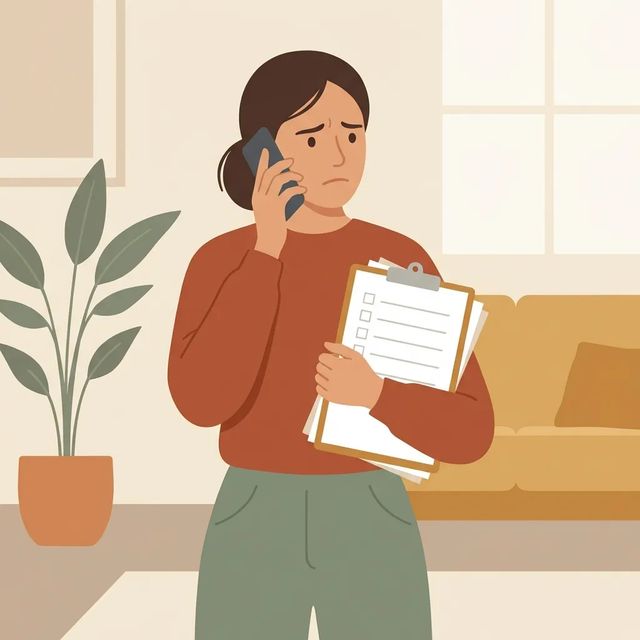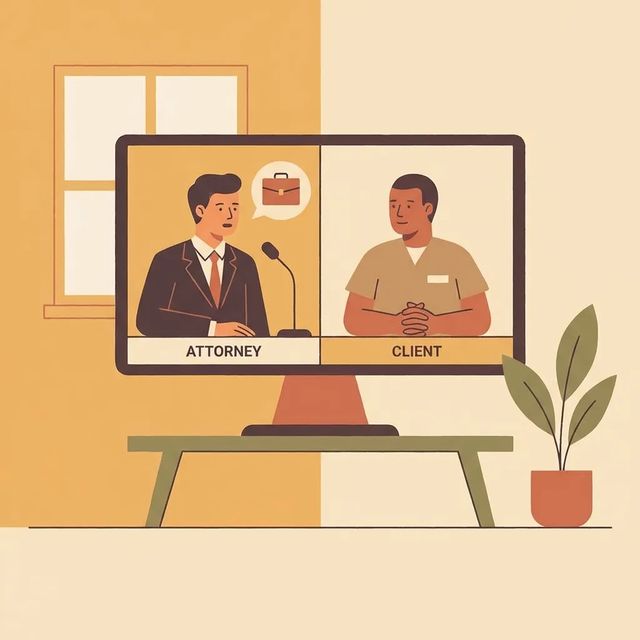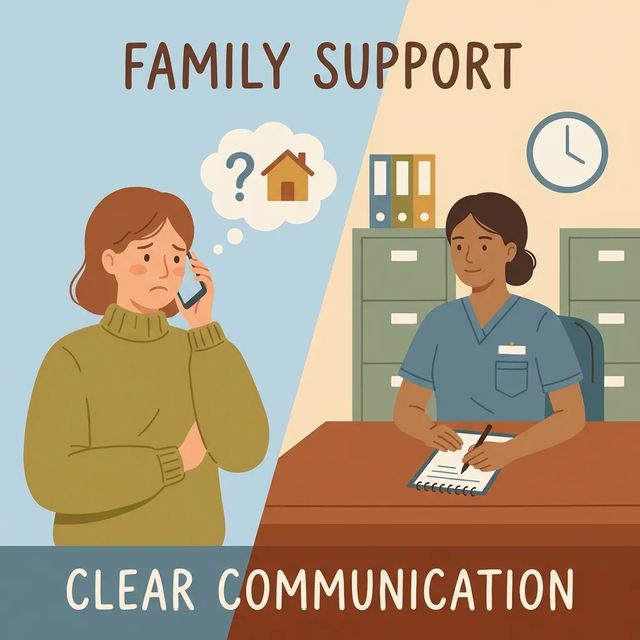Broward Transitional Center
Explore
Find an Inmate at Broward Transitional Center
Search for a loved one and send messages and photos in minutes.

Guides for This Facility

Before You Call Broward Transitional Center: A Quick Reference Guide
A few minutes of prep saves you time on the phone. Have this info ready so staff can find the right person and route your message quickly.
Read Guide
Virtual Attorney Visits at Broward Transitional Center: Scheduling, Who Can Join, and Rules
Broward Transitional Center offers Virtual Attorney Visitation (VAV) for confidential attorney–client conversations via Skype and Microsoft Teams. The facility positions VAV as a timely, efficient option when in-person meetings aren't practical—though it's not meant to replace face-to-face legal visits entirely.
Read Guide
How to Leave an Urgent Message for Someone at Broward Transitional Center
Detainees at Broward Transitional Center can't receive incoming phone calls. If you need to get an urgent message through, call the facility with the required details and staff will pass your message along to the detainee.
Read GuideAt a Glance
Visitation
- To request information about a detainee, call Broward Transitional Center at (954) 973-4485 between 8 a.m. and 4 p.m.
- The facility supports confidential Virtual Attorney Visits using Skype and Microsoft Teams.
- A visitation officer will be stationed outside the confidential room during virtual attorney visits to maintain safety and security.
Communication
- Detainees cannot receive incoming phone calls at Broward Transitional Center.
- To leave an urgent message call (954) 973-4485 and provide the detainee’s full name, alien registration number, and your contact information.
- The facility provides tablets and refers people to www.gettingout.com for sending non-confidential messages.
Contact Info
- Call (954) 973-4485 to request information about a detainee; phone answered between 8 a.m. and 4 p.m.
- For VAV scheduling or VAV questions call 954-973-4485 ext. 129796 or email BTCVTC3900@geogroup.com.
- Use the facility front desk or non‑emergency line for booking, detainee status, and routine administrative inquiries.
Facility Info
- ICE ODO recorded an inspection covering Broward Transitional Center in Pompano Beach on September 14–17, 2020.
- The ODO inspection was conducted remotely because the team could not perform an on-site inspection due to the COVID-19 pandemic.
- ICE states many detention facilities provide tablets that support video visitation, messaging, law-library research, and entertainment applications.
Based on official sources and community feedback. Learn how we verify
Topic Overviews
Visitation
For detainee information at Broward Transitional Center, call (954) 973-4485 between 8 a.m. and 4 p.m. The facility offers confidential Virtual Attorney Visits (VAV) through Skype and Microsoft Teams—an alternative to in-person meetings, though not a replacement. During these sessions, a visitation officer stays stationed outside the confidential room for security. Legal representatives and their staff cannot audio or video record during virtual or in-person visits, or any call with non-citizens. Before visiting, get on the approved visitor list, complete the required application, submit it as instructed, and wait for approval before traveling.
Read full guideCommunication
Broward Transitional Center doesn't accept incoming phone calls to detainees—you can't reach someone directly by calling. Need to leave an urgent message? Call (954) 973-4485 with the detainee's full name, alien registration number (A-number), and your contact info. The facility says the detainee will receive the message. For everyday, non-confidential communication, detainees have access to tablets. Friends and family can visit www.gettingout.com for instructions on sending messages through GettingOut. Attorneys can schedule confidential conversations through Virtual Attorney Visitation (VAV) via Skype or Microsoft Teams. VAV serves as an alternative to in-person meetings, not a substitute. Only legal representatives, legal assistants, and interpreters may participate. Recording is prohibited, and violations can result in losing VAV privileges.
Read full guideContact
For detainee information or routine questions, call Broward Transitional Center at (954) 973-4485. The public phone is answered between 8 a.m. and 4 p.m. This main number handles booking, administrative questions, and basic status checks. Need help with VAV scheduling specifically? Use the dedicated VAV contact: call 954-973-4485 ext. 129796 or email BTCVTC3900@geogroup.com. For urgent threats to life or public safety, contact local emergency services—not the facility. Having trouble with payments, accounts, commissary, or phone/video services? You'll typically need to work with the third-party vendor, though the facility can point you to the right customer service line.
Read full guideFacility Info
ICE's Office of Detention Oversight inspected Broward Transitional Center in Pompano Beach on September 14–17, 2020. The inspection was conducted remotely—the team couldn't complete an on-site visit due to the COVID-19 pandemic. Separately, ICE notes that many detention facilities provide in-custody tablets supporting video visitation, two-way messaging, law-library research, and entertainment. ICE has contracted with Talton to supply tablets at select facilities, while other locations use different contractors or county-provided programming. For specifics about Broward Transitional Center—tablets, visitation, commissary, intake—check the facility handbook or contact the center directly.
Common Questions
Showing 6 of 12How can I get information about a detainee at Broward Transitional Center?
Call Broward Transitional Center at (954) 973-4485 between 8 a.m. and 4 p.m. to request detainee information.
VisitationCan attorneys meet confidentially with clients at Broward Transitional Center by video?
Yes. Broward Transitional Center supports confidential Virtual Attorney Visits using Skype and Microsoft Teams. VAV is an alternative (not a substitute) for in-person meetings, and an officer is stationed outside the confidential room during the session for security.
VisitationAre attorneys allowed to record visits or calls with detainees at Broward Transitional Center?
No. Legal representatives and their staff are not permitted to audio or video record during virtual or in-person visits, or any call with non-citizens at the facility.
VisitationCan detainees at Broward Transitional Center receive incoming phone calls?
No. Broward Transitional Center does not accept incoming phone calls to detainees.
CommunicationHow do I leave an urgent message for someone at Broward Transitional Center?
Call (954) 973-4485 and provide the detainee’s full name, alien registration number (A-number), and your contact information. The facility states the detainee will be given the urgent message.
CommunicationHow can attorneys conduct confidential remote visits with detainees at Broward?
Attorneys may use Virtual Attorney Visitation (VAV) via Skype or Microsoft Teams for confidential attorney–client conversations, and they must show appropriate identification such as a bar card or proof of bar membership before the scheduled meeting. Only attorneys, legal assistants, and interpreters may participate; a visitation officer monitors the confidential room, recording is prohibited, and violations can result in suspension or permanent revocation of VAV privileges.
CommunicationMore Guides
Ready to Connect?
Search for your loved one to start communicating today
Did You Know?
Need information about a detainee at Broward Transitional Center in Florida? Call (954) 973-4485. Phone lines are open Monday through Friday, 8 a.m. to 4 p.m.
This guide is compiled from official facility documentation and community feedback. Learn how we verify
